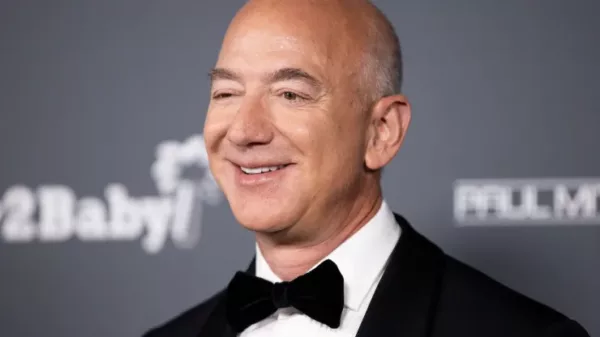
Jeff Bezos Just Accidentally Revealed The TRUTH!!

In a series of transactions that have raised eyebrows across Wall Street, Jeff Bezos, founder of Amazon.com Inc., has significantly reduced his stake in the company he created. Following close on the heels of JPMorgan Chase & Co. CEO Jamie Dimon’s divestiture of shares worth approximately $140 million, Bezos’s move has stoked speculations of an impending economic shift that these market savants might be anticipating.
Mainstream Media vs. Market Realities
According to CNBC, Bezos’s recent actions are described as ‘aggressive’ selling, a term that has sparked a flurry of analysis among investors and economists alike. This is not the first instance of Bezos liquidating Amazon stock; however, the timing and magnitude of the sales, amounting to around $1.24 billion, have fueled theories that these decisions are more than just routine financial planning.

Critics argue that as the architect of the world’s most formidable e-commerce platform, Bezos’s sales could be interpreted as signaling his stance on the near-term economic landscape and consumer health—a sector where Amazon serves as a primary barometer. The company’s unparalleled data on consumer spending habits affords Bezos an insight arguably unmatched by any other corporate entity.
The Transparency Debate
The public relations machinery on behalf of both Bezos and Dimon has been quick to downplay these transactions. Representatives assert that such sales are part of normal business operations, with Dimon’s spokesperson attributing his sales to considerations of retirement planning. Similarly, Amazon’s PR team has noted that Bezos’s sales are an annual occurrence.
Despite these reassurances, the market reaction has been undeniably potent, with Amazon’s stock experiencing notable volatility in the wake of these developments. This raises a crucial question: If the CEOs of two of America’s most influential corporations are scaling back their holdings, is there a larger economic undercurrent they are privy to?
The potential implications are manifold. In the short term, a sell-off from figures like Bezos and Dimon could portend turbulence for the respective sectors they dominate. Over a longer horizon, there may be opportunities for consolidation and strategic realignments within the banking and e-commerce spaces, respectively.
As the market continues to digest these high-profile stock sales, the broader investment community remains on alert. The actions of Bezos and Dimon could well be personal financial strategy—or a harbinger of economic headwinds to come.
The Motives: Philanthropy or Financial Foresight?
As the world’s third-richest man, Jeff Bezos’s recent decision to sell up to 10 million shares of Amazon has sent ripples through the financial community, challenging the public’s confidence in the retail behemoth and, by extension, the overall economy. This divestment aligns curiously with Jamie Dimon’s sale of a million JPMorgan shares, begging the question of what these financial titans foresee on the economic horizon.
The narrative spun by publicists and media often paints such stock sales as benign or routine. However, the scale and timing of these moves by Bezos and Dimon suggest a lack of transparency that many find condescending, hinting at insider knowledge not reflected in public statements.
While Bezos cites charitable giving as one reason for his stock sale, there is skepticism about the sincerity of such claims. His philanthropic pledges, like the $100 million to recovery efforts in Maui, seem disproportionate to the billions liquidated from his Amazon holdings. Critics argue that these funds may be channeled into safer government bonds, anticipating a potential downturn in Amazon’s stock value.
Reading Between the Lines
The broader economic context cannot be ignored. With data points like the inversion of the yield curve and 60% of Americans living paycheck to paycheck, there is a growing sentiment that we are not merely approaching a recession but may already be in the throes of one. For those with the resources and insight of Bezos, a pivot in investment strategy might be a prudent, if not inevitable, response.
